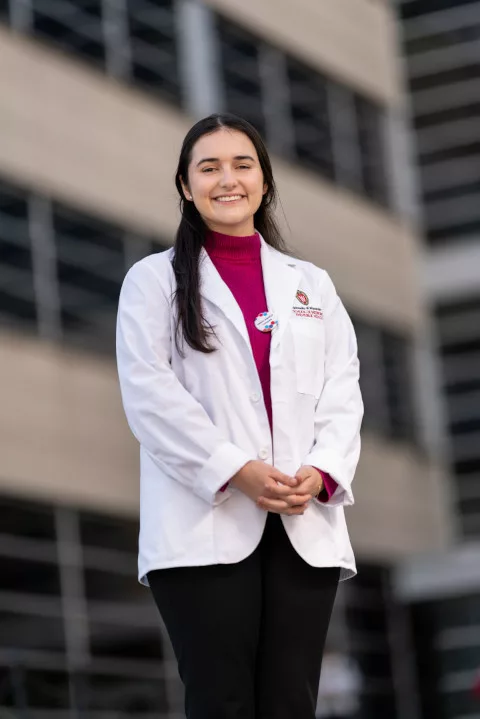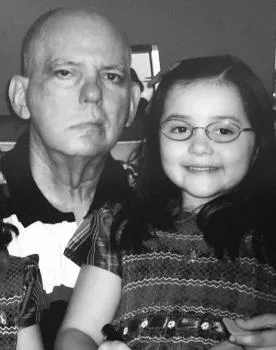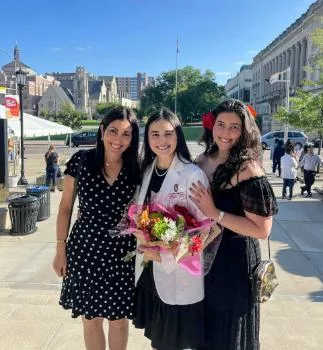Kyla Lee’s Reflective Style Guides Her Actions
Lee aims to strengthen the school by building relationships between students and alumni.
As María Cecilia Abreu González begins her medical school journey as a member of the University of Wisconsin School of Medicine and Public Health’s entering class of 2022, she has much to reflect on: her culture and language, larger-than-life grandfather, incredible mother and fascination with neurology — plus the experience of a terrorist attack in Nice, France, while she was traveling there.
Each of these factors has punctuated her journey and slowly but surely set her on a path to be the first in her family to train as a physician. And she’s doing so at a school far from her homeland.

Born and raised in Puerto Rico, Abreu González’s maternal grandfather was a great influence. His health issues from a rare form of skin cancer exposed Abreu González to the health care system. She recalls one of his surgeries, which required the removal of nearly his entire cheek and replacement with skin from his thigh.
“I remember being amazed at what medical professionals could do,” she recalls. “I was more than happy to help him and put cream on his wound. He told me I had to be a doctor. And I said, ‘Yes, I am going to be a doctor and take care of you,’ but I didn’t know anything about the training or how long it would take to get into medicine.”
When Abreu González was in 10th grade, her grandfather passed away, and her desire to become a doctor temporarily faded. But that started to re-emerge a couple of years later in 2016 while she was on an international trip with other high school students in Nice, France. It was Bastille Day — a French holiday filled with parades, dancing and other celebrations, and after a fireworks display, she continued to hear loud noises and saw people running in all directions. She sought refuge in the storage closet of a shoe store and—not knowing what would happen — she sent a text message to her mom to say she was afraid that the message may be her last.
Hours later, safely back at her hotel watching television, she learned that a cargo truck had driven through the crowd before police began firing shots. Watching the first responders on TV, her desire to help people through medicine rushed back.

Abreu González reflects, “After my grandfather passed away, I began to question — Do I really want to be a doctor? Or was this just something we came up with together?”
She continues, “I struggled for a while, but I began to realize it is a blessing to be able to help others. My experience seeing those first responders help people in France made me realize this is what I want to do.”
Her grandfather’s influence continued when she started her undergraduate education. He had gone to a Catholic Jesuit high school in Puerto Rico and later attended — of all places — Marquette University in Milwaukee, Wisconsin, also a Jesuit institution. Knowing nothing about Wisconsin and never having been to the Midwest, Abreu González decided to take the same leap her grandfather had in the 1960s.
At Marquette, Abreu González excelled academically and discovered a love of biology, particularly neurology, and overcame a learning disability to discover a talent for teaching and mentoring. She put in more than 500 volunteer hours at a Milwaukee hospital, filling her resume with activities she was passionate about. She also learned that she likely lived in the same dorm as her grandfather because her grandmother recalled the building name from letters he used to write.
During the COVID-19 pandemic, Abreu González began to see how health disparities were causing members of the Latinx and Black communities to die from the novel coronavirus at higher rates than other populations. This showed how valuable integrating public health can be, and it opened her eyes to a career in medicine that she had never thought of.
She says the SMPH’s emphasis on this intersection of medicine and public health was a huge draw. Because she wants to return to Puerto Rico to practice medicine, Abreu González knew this kind of training would be valuable. In addition, she says it was the only school that put her in touch with the Office of Multicultural Affairs even before she decided to matriculate.

“The people I met at UW–Madison knew I may feel different from the majority of the student population and wanted to make sure I felt accommodated and had a sense of community before I even joined,” Abreu González shares. “I thought this was so important and reflected the school’s health equity and public health missions.”
Although she is living more than 2,000 miles from Puerto Rico, she still carries with her the memory of her grandfather and support of her mother, who Abreu González refers to as “another incredible role model” and says she has taught her how to persevere through any challenge.
“Thinking about being in Wisconsin was weird for me at first because it seemed so far away from my island,” says Abreu González. “But I knew I was deciding to go to Marquette because of my grandfather, and I ended up loving it. And now that I am attending the UW School of Medicine and Public Health, I’ve always thought he has been with me, guiding me. Staying in Wisconsin, I still feel connected to him.”